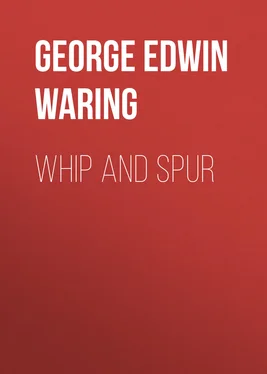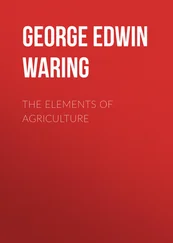George Edwin Waring - Whip and Spur
Здесь есть возможность читать онлайн «George Edwin Waring - Whip and Spur» — ознакомительный отрывок электронной книги совершенно бесплатно, а после прочтения отрывка купить полную версию. В некоторых случаях можно слушать аудио, скачать через торрент в формате fb2 и присутствует краткое содержание. Жанр: Биографии и Мемуары, История, foreign_edu, foreign_antique, foreign_prose, на английском языке. Описание произведения, (предисловие) а так же отзывы посетителей доступны на портале библиотеки ЛибКат.
- Название:Whip and Spur
- Автор:
- Жанр:
- Год:неизвестен
- ISBN:нет данных
- Рейтинг книги:4 / 5. Голосов: 1
-
Избранное:Добавить в избранное
- Отзывы:
-
Ваша оценка:
- 80
- 1
- 2
- 3
- 4
- 5
Whip and Spur: краткое содержание, описание и аннотация
Предлагаем к чтению аннотацию, описание, краткое содержание или предисловие (зависит от того, что написал сам автор книги «Whip and Spur»). Если вы не нашли необходимую информацию о книге — напишите в комментариях, мы постараемся отыскать её.
Whip and Spur — читать онлайн ознакомительный отрывок
Ниже представлен текст книги, разбитый по страницам. Система сохранения места последней прочитанной страницы, позволяет с удобством читать онлайн бесплатно книгу «Whip and Spur», без необходимости каждый раз заново искать на чём Вы остановились. Поставьте закладку, и сможете в любой момент перейти на страницу, на которой закончили чтение.
Интервал:
Закладка:
Poor Vixen (that had been her name in her better days, and it was to be her name again), she had found it hard kicking against the pricks! Clam-carts are stronger than trotting-wagons, and even her efforts had been vain. She had succumbed to dire necessity, and earned her ignoble oats with dogged fidelity. She had a little warm corner in her driver’s affections,—as she always had in the affections of all who came to know her well,—but her lot was a very hard one. Worn to a skeleton, with sore galls wherever the harness had pressed her, her pasterns bruised by clumsy shoes, her silky coat burned brown by the sun, and her neck curved upward, it would have needed more than my knowledge of anatomy to see anything good in her but for her wonderful head. This was the perfection of a horse’s head,—small, bony, and of perfect shape, with keen, deer-like eyes, and thin, active ears; it told the whole story of her virtues, and showed no trace of her sufferings. Her royal blood shone out from her face, and kept it beautiful.
My mind was made up, and Vixen must be mine at any cost. Still, it was important to me to buy as cheaply as I could,—and desirable, above all, not to be jockeyed in a horse-trade; so it required some diplomacy (an account of which would not be edifying here) to bring the transaction to its successful close. The pendulum which swung between offer and demand finally rested at seventy-five dollars.
She was brought to me at the Park on a bright moonlight evening in June, and we were called out to see her. I think she knew that her harness days were over, and she danced off to her new quarters as gay as a colt in training. That night my wakefulness would have done credit to a boy of sixteen; and I was up with the dawn, and bound for a ride; but when I examined poor Vix again in her stable, it seemed almost cruel to think of using her at all for a month. She was so thin, so worn, so bruised, that I determined to give her a long rest and good care,—only I must try her once, just to get a leg over her for five minutes, and then she should come back and be cared for until really well. It was a weak thing to do, and I confess it with all needful humiliation, but I mounted her at once; and, although I had been a rider all my days, this was the first time I had ever really ridden. For the first time in my life I felt as though I had four whalebone legs of my own, worked by steel muscles in accordance with my will, but without even a conscious effort of will.
That that anatomy of a horse should so easily, so playfully, handle my heavy weight was a mystery, and is a mystery still. She carried me in the same high, long-reaching, elastic trot that we sometimes see a young horse strike when first turned into a field. A low fence was near by, and I turned her toward it. She cleared it with a bound that sent all my blood thrilling through my veins, and trotted on again as though nothing had occurred. The five minutes’ turn was taken with so much ease, with such evident delight, that I made it a virtue to indulge her with a longer course and a longer stride. We went to the far corners of the Park, and tried all our paces; all were marvellous for the power so easily exerted and the evident power in reserve.
Yes, Frank Forester was right, blood horses are made of finer stuff than others. My intention of giving the poor old mare a month’s rest was never carried out, because each return to her old recreation—it was never work—made it more evident that the simple change in her life was all she needed; and, although in constant use from the first, she soon put on the flesh and form of a sound horse. Her minor bruises were obliterated, and her more grievous ones grew into permanent scars,—blemishes, but only skin deep; for every fibre of every muscle, and every tendon and bone in her whole body, was as strong and supple as spring steel.
The Park afforded good leaping in those days. Some of the fences were still standing around the abandoned gardens, and new ditches and old brooks were plenty. Vixen gave me lessons in fencing which a few years later, in time of graver need, stood me in good stead. She weighed less than four times the weight that she carried; yet she cleared a four-foot fence with apparent ease, and once, in a moment of excitement, she carried me over a brook, with a clear leap of twenty-six feet, measured from the taking-off to the landing.
Her feats of endurance were equal to her feats of strength. I once rode her from Yorkville to Rye (twenty-one miles) in an hour and forty-five minutes, including a rest of twenty minutes at Pelham Bridge, and I frequently rode twenty-five miles out in the morning and back in the afternoon. When put to her work, her steady road gallop (mostly on the grassy sides) was fifteen miles an hour.
Of course these were extreme cases; but she never showed fatigue from them, and she did good service nearly every day, winter and summer, from her twelfth to her fifteenth year, keeping always in good condition, though thin as a racer, and looking like a colt at the end of the time. Horsemen never guessed her age at more than half of what it actually was.
Beyond the average of even the most intelligent horses, she showed some almost human traits. Above all was she fond of children, and would quiet down from her wildest moods to allow a child to be carried on the pommel. When engaged in this serious duty, it was difficult to excite her, or to urge her out of a slow and measured pace, although usually ready for any extravagance. Not the least marked of her peculiarities was her inordinate vanity. On a country road, or among the workmen of the Park, she was as staid and business-like as a parson’s cob; but let a carriage or a party of visitors come in sight, and she would give herself the prancing airs of a circus horse, seeming to watch as eagerly for some sign of approval, and to be made as happy by it, as though she only lived to be admired. Many a time have I heard the exclamation, “What a beautiful horse!” and Vix seemed to hear it too, and to appreciate it quite as keenly as I did. A trip down the Fifth Avenue in the afternoon was an immense excitement to her, and she was more fatigued by it than by a twenty-mile gallop. However slowly she travelled, it was always with the high springing action of a fast trot, or with that long-stepping, sidelong action that the French call á deux pistes ; few people allowed her to pass without admiring notice.
Her most satisfactory trait was her fondness for her master; she was as good company as a dog,—better, perhaps, because she seemed more really a part of one’s self; and she was quick to respond to my changing moods. I have sometimes, when unable to sleep, got up in the night and saddled for a ride, usually ending in a long walk home, with the bridle over my arm, and the old mare’s kind face close beside my own, in something akin to human sympathy; she had a way of sighing, when things were especially sad, that made her very comforting to have about. So we went on for three years, always together, and always very much to each other. We had our little unhappy episodes, when she was pettish and I was harsh,—sometimes her feminine freaks were the cause, sometimes my masculine blundering,—but we always made it up, and were soon good friends again, and, on the whole, we were both better for the friendship. I am sure that I was, and some of my more grateful recollections are connected with this dumb companion.
The spring of 1861 opened a new life for both of us,—a sad and a short one for poor Vix.
I never knew just how much influence she had in getting my commission, but, judging by the manner of the other field officers of the regiment, she was evidently regarded as the better half of the new acquisition. The pomp and circumstance of glorious war suited her temper exactly, and it was ludicrous to see her satisfaction in first wearing her gorgeous red-bordered shabrack; for a time she carried her head on one side to see it. She conceived a new affection for me from the moment when she saw me bedecked with the dazzling bloom that preceded the serious fruitage of the early New York volunteer organizations.
Читать дальшеИнтервал:
Закладка:
Похожие книги на «Whip and Spur»
Представляем Вашему вниманию похожие книги на «Whip and Spur» списком для выбора. Мы отобрали схожую по названию и смыслу литературу в надежде предоставить читателям больше вариантов отыскать новые, интересные, ещё непрочитанные произведения.
Обсуждение, отзывы о книге «Whip and Spur» и просто собственные мнения читателей. Оставьте ваши комментарии, напишите, что Вы думаете о произведении, его смысле или главных героях. Укажите что конкретно понравилось, а что нет, и почему Вы так считаете.












